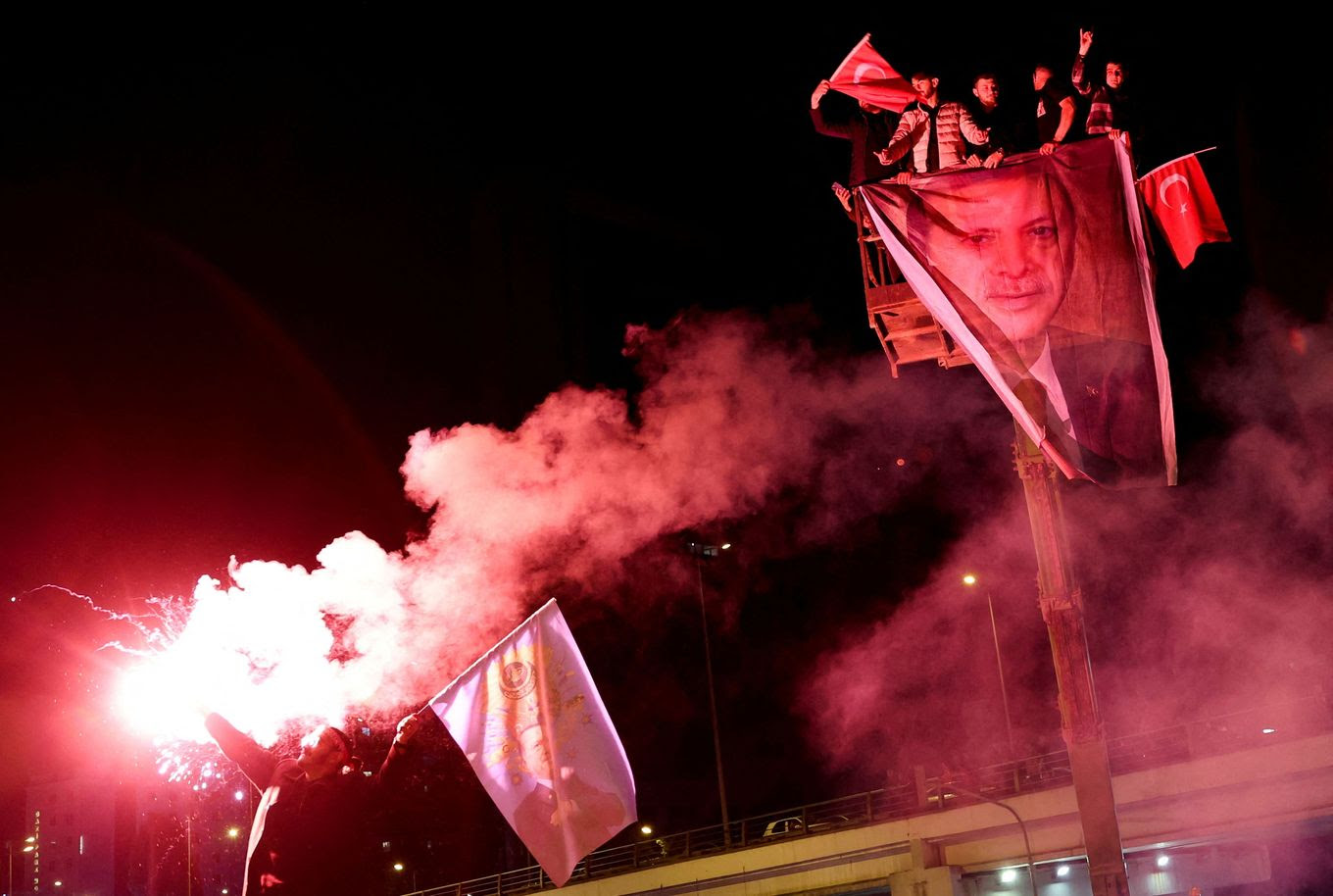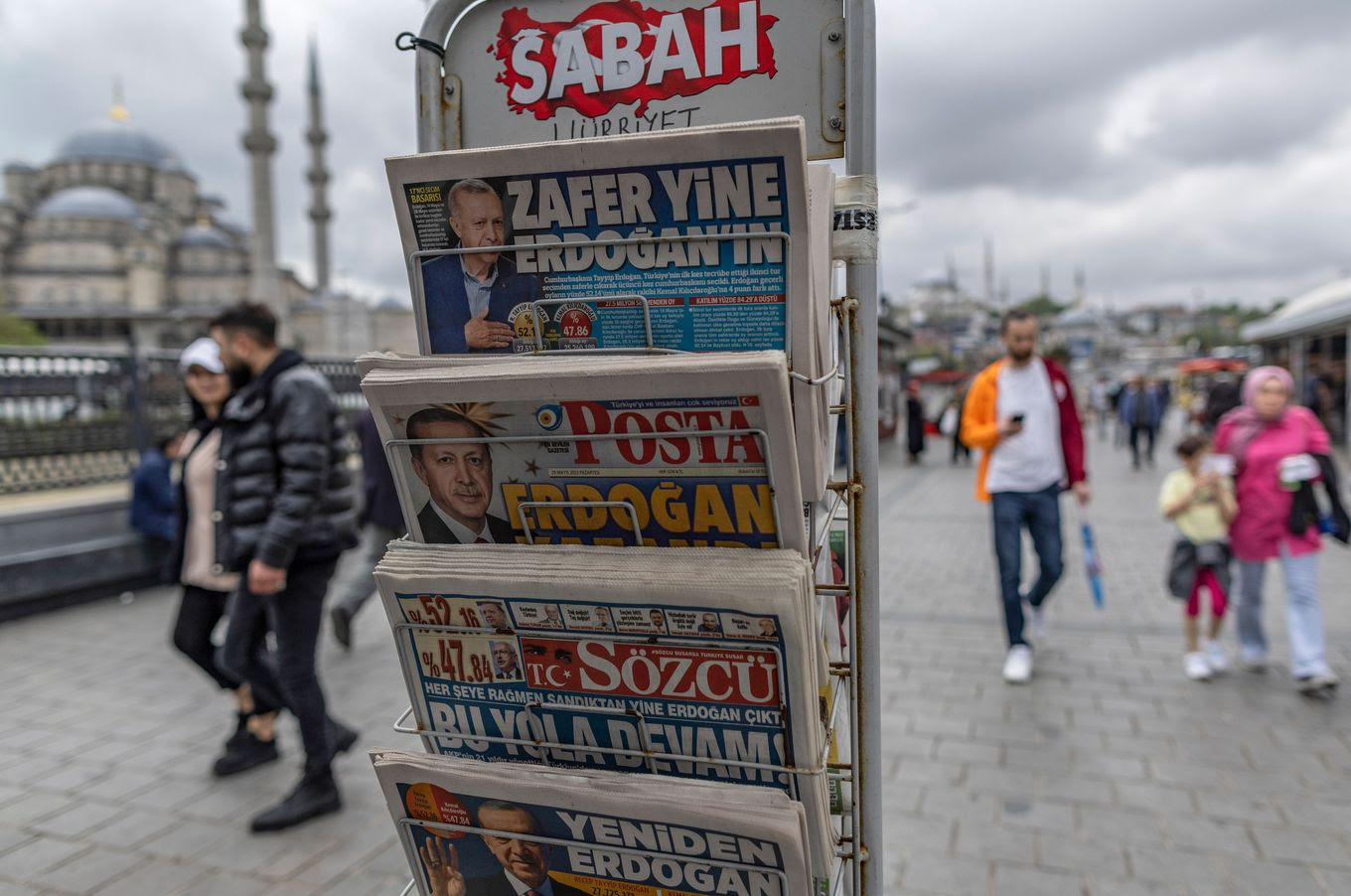 Supporters of Turkish President Recep Tayyip Erdogan celebrate following his victory in the second round of the presidential election in Ankara, Turkey, on Monday. (Umit Bektas/Reuters) |
He doesn’t have Russian President Vladimir Putin’s nuclear weapons. He doesn’t have Indian Prime Minister Narendra Modi’s geopolitical clout at the helm of the world’s most populous country. He doesn’t have Hungarian Prime Minister Viktor Orban’s European Union bully pulpit and right-wing allies in the United States. And he doesn’t have Israeli Prime Minister Benjamin Netanyahu’s long track record of proving that reports of his political demise are greatly exaggerated — at least, not yet. But, through his two decades in power, Turkish President Recep Tayyip Erdogan has pioneered a path that leaves many of these demagogues in his shadow. Few statesmen on the world stage have left such a defining imprint on their nations. And few have staved off real electoral challenges with Erdogan’s guile and ruthlessness, mobilizing a core bloc of religious and nationalist voters with incessant culture warring, while also leveraging his overwhelming control of the state apparatus in his favor. On Sunday, Erdogan secured a presidential election runoff victory against opposition candidate Kemal Kilicdaroglu, winning 52 percent of the vote. The narrow margin was testament to the vast population of Turkish voters who want to end Erdogan’s reign, which is now poised to enter a third decade. But the Turkish president is skilled at outmaneuvering his adversaries, not least Kilicdaroglu, who is likely at the end of the road of his political career after failing yet again to dethrone Erdogan. Erdogan has “managed to split Turkey … into two blocs: for or against Erdogan,” Emre Peker, an analyst at the Eurasia Group consultancy, told the Financial Times. “Even with Turkey going through its worst economic period since the 2001 financial crisis, Erdogan can still win elections on identity politics.”  Newspapers for sale at a newsstand in Istanbul the day after the second round of presidential elections on Monday. (Erdem Sahin/EPA-EFE/Shutterstock) |
In his victory speech in Ankara before a huge crowd of supporters, Erdogan continued to snarl grievance. He cast the opposition as figures backed by foreign enemies, complicit in supporting anti-state insurgency and in favor of a supposedly radical embrace of feminist and LGBTQ beliefs. “Didn’t German, French and English magazines throw their covers to demolish Erdogan? Here they lost too, my brothers!” Erdogan said. “You’ve seen the alliances that have been formed for months. You have seen who is standing against us from terrorist organizations to deviant ideologies. What happened though? They failed.” Analysts expect the polarizing rhetoric to be sustained as Erdogan faces a complex set of challenges at home, including a cost-of-living crisis and significant public anger over mismanagement of the economy. “He delivered his most aggressive balcony speech because that is how autocrats cling to power against unfavorable odds,” tweeted Gonul Tol, a Turkey expert at the Middle East Institute think tank in Washington. “They stoke fear and frame elections as a war for survival. That is how they prevent defections. That is how they can still muster majorities even when they fail to deliver.” Erdogan’s arc is well-chronicled — he went from being a somewhat liberal, reformist prime minister to a domineering president who rewrote the country’s political system, co-opted the press and cowed the judiciary. For a time, his religiously tinged politics seemed a riposte to the rigid secularist nationalism of the modern Turkish republic’s founder, Mustafa Kemal Ataturk. He appealed to communities of more pious, conservative voters in the country’s hinterlands who long felt marginalized or unseen by the elites in Turkey’s coastal cities. His latest successful reelection, which centered on a coalition of voters that included pious Muslims and hard-right nationalists, showed the evolution of his governing ideology. “Where observers focused on the divide between religion and nationalism, Erdogan grasped how effectively they could be wielded together,” wrote Nicholas Danforth, a historian of modern Turkey, in New Lines Magazine. But experts fear the toxic effects of what the president has harnessed and unleashed. “Erdogan put together a winning coalition based on fault lines: Turkish versus Kurdish nationalism, secular-urban versus the Sunni majority. This is a winning formula,” Berk Esen, a professor of political science at Istanbul’s Sabanci University, told my colleague Kareem Fahim. “This is not a better formula for Turkey.” Even as Erdogan consolidated his rule under a new centralized presidential system through a controversial referendum, political scholars still saw Turkey as a quasi-democracy. This was not Putin’s Russia, where elections were a fait accompli and the recognized opposition is simply a pliant cipher for the Kremlin. In Turkey, the consensus went, elections remained real contests and civil society activists, though under pressure, had far greater freedoms than some of their counterparts across the Black Sea. That view is starting to change as Erdogan renews his mandate for power. It’s impossible to see the elections as “fair,” given the disproportionate resources at Erdogan’s disposal, his monopoly over state media and his control over state institutions. And they are increasingly less “free,” with the government weaponizing the legal system to throw opposition candidates in jail or disqualify them from competing. “The outcome of the May elections suggests that Turkey has now shifted closer to a Eurasian autocracy than an illiberal European democracy,” Soner Cagaptay, Turkey scholar at the Washington Institute for Near East Policy, wrote in Foreign Affairs. “Just as Putin had acquired sweeping executive powers in Russia, Erdogan had now become Turkey’s most powerful elected leader since the country’s first free and fair vote in 1950 — in effect a new Sultan,” Cagaptay added. “More symbolically, like Putin, who has increasingly portrayed himself as successor to Russia’s greatest tsars, Erdogan also began to embrace the trappings of an imperial head of state.” Erdogan’s critics now warn of grim times to come. “He may eradicate whatever is left of the independent judiciary, free press and critical academia,” wrote Mustafa Akyol, a senior fellow at the Cato Institute. “He has also promised a whole new constitution, which could realize many of the dreams of the religious right. Suggestions by pro-Erdogan partisans include abolishing the constitutional court, putting even more religion into public education, curbing women’s rights and banning ‘heretical’ (liberal) interpretations of Islam.” The reality of Erdogan’s entrenched electoral autocracy was all the more clear after world leaders — including Modi, Putin, but also President Biden — all congratulated Erdogan on his victory with no mention of any concerns for Turkey’s democratic future. At his speech in Ankara, Erdogan vowed to keep Selahattin Demirtas, a popular leader of the pro-Kurdish Peoples’ Democratic Party, in prison, where he has languished since 2016 on pending terrorism charges that are considered by many observers to be trumped up. In response, Erdogan’s supporters chanted for Demirtas’s death. On the eve of the runoff vote, Demirtas issued a message from jail urging voters to back Kilicdaroglu. “Tomorrow is not the end of the world, but it may also be the end of democracy,” he said. “Tomorrow is not the day of judgment, but it may be the last election.” | 

No comments:
Post a Comment